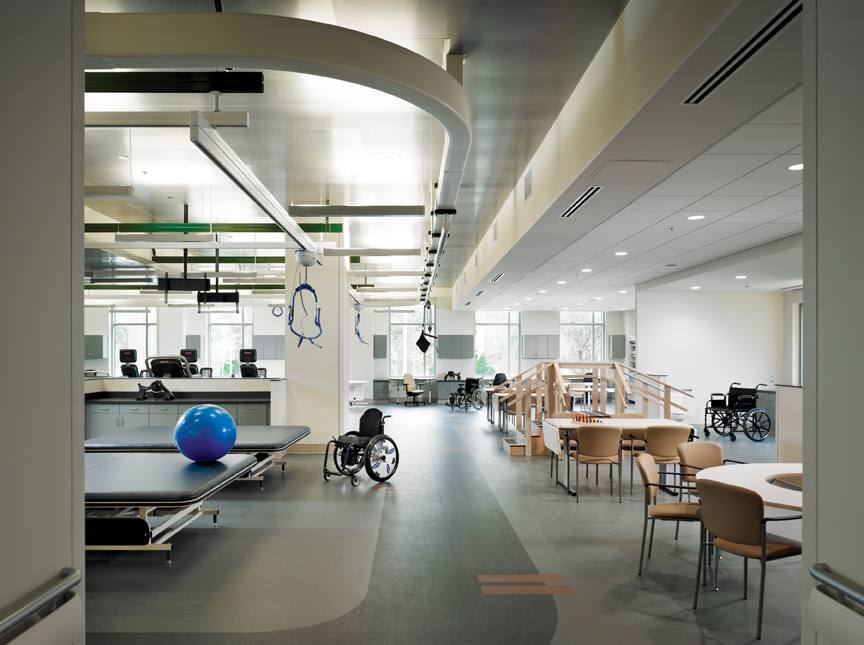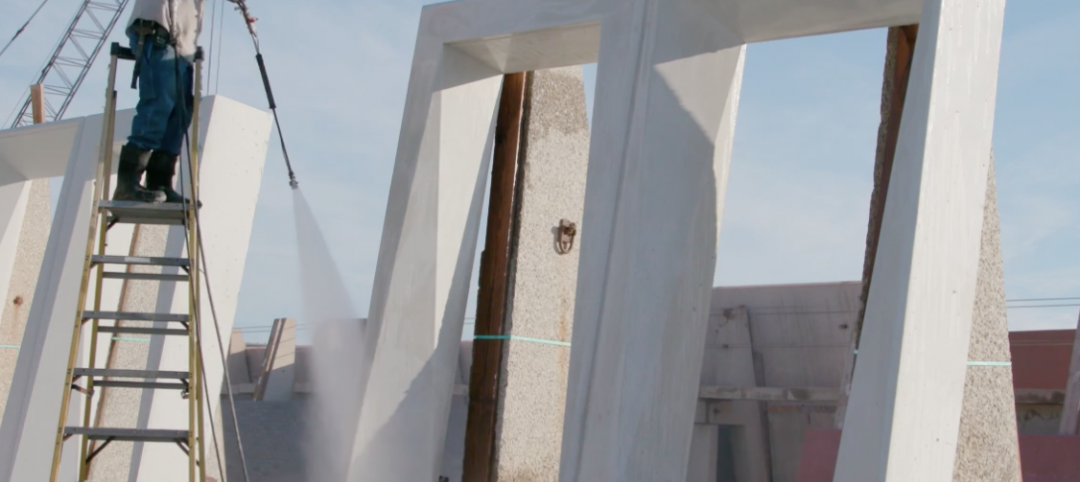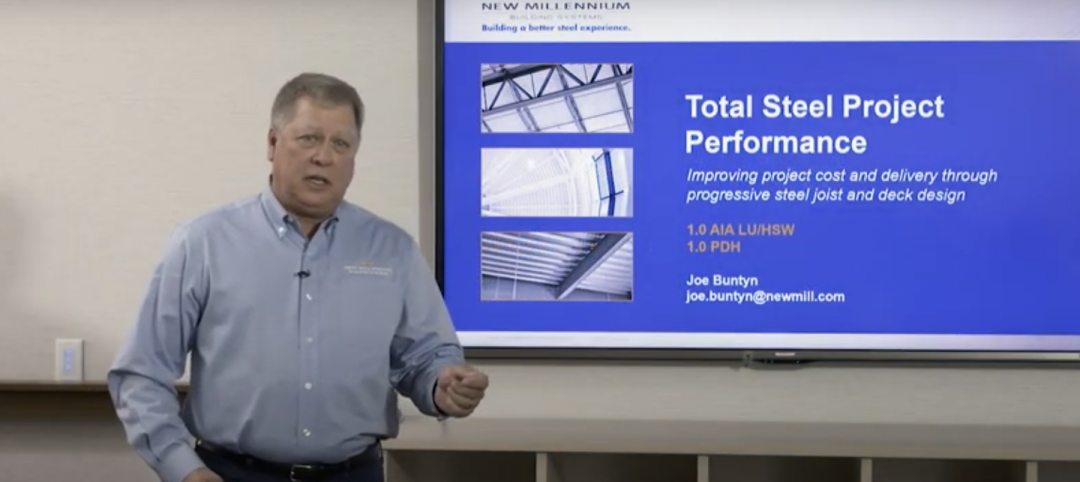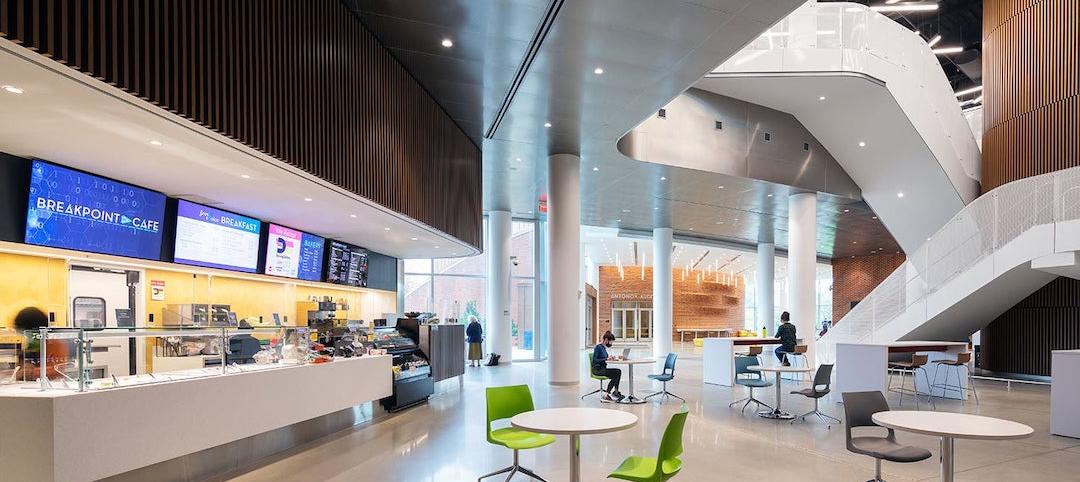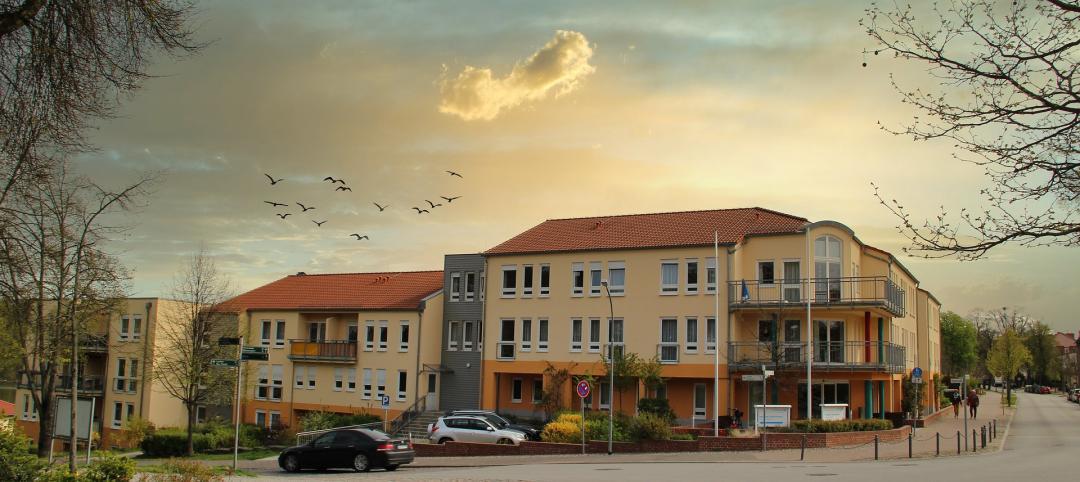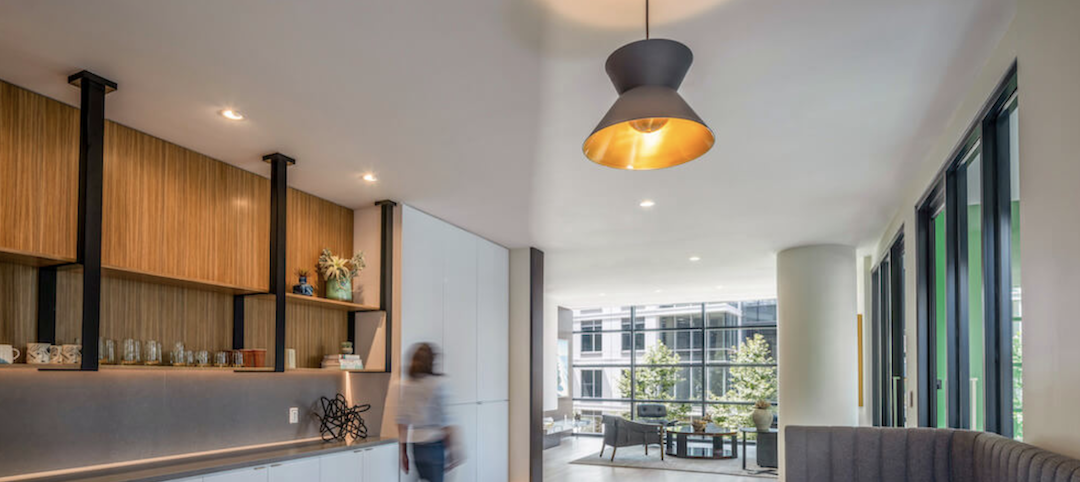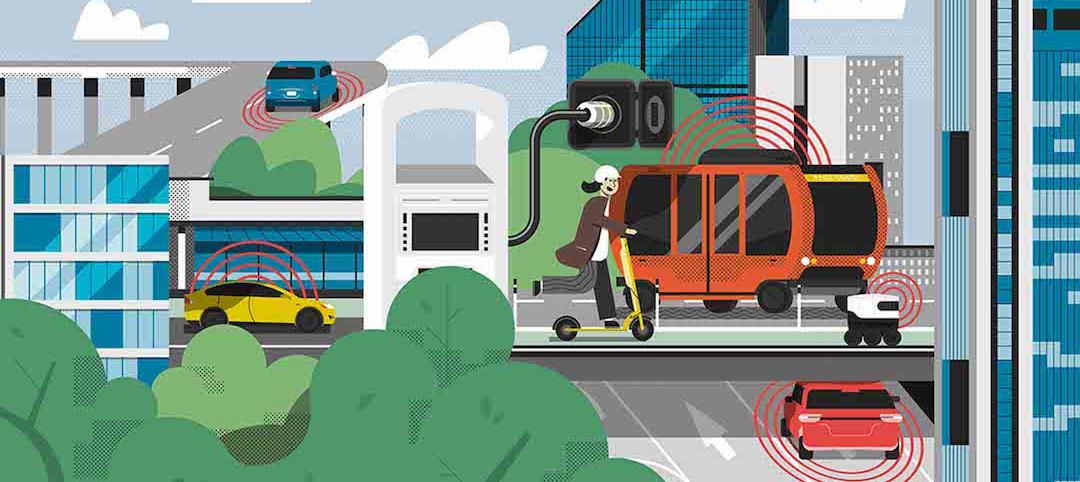2012 Building Team Awards
Gold Award
Since the early 2000s, the U.S. Department of Veterans Affairs has treated more than 200,000 Iraq- and Afghanistan-war veterans for post-traumatic stress disorder. The rate of traumatic brain injury (TBI) among U.S. forces has risen dramatically in the last decade as well, from 10,963 cases in all of 2000 to 30,380 just in the fourth quarter of 2011.
Audie L. Murphy VA Hospital in San Antonio, Texas, named after the most decorated soldier of World War II, provides a place for this dramatically increasing number of wounded veterans to receive care. The Building Team—prime contractor Robins & Morton and joint venture design firms SmithGroupJJR and Marmon Mok—faced complicated site logistics and security restrictions, but still managed to come in under budget and produce a facility that meets the physical and psychological needs of the veterans it serves.
This hospital was the VA’s first project constructed under the so-called “Integrated Design and Construct” method, which teams the contractor with the architect and owner early in the construction process. The Building Team credits this collaboration with the facility’s month-early completion and $3.75 million cost savings. Although the project was not required to be LEED-certified, the team still implemented high-level sustainability.
At the project’s core were the hospital’s patients: veterans recuperating from multiple traumatic injuries, often including limb loss and TBI. The “Planetree” principle—which seeks to create a healing environment inspired by nature—was employed throughout the facility’s design.
Because many TBI patients are extremely sensitive to light and noise, the Building Team used indirect and accent lighting and equipped each bed with controls so every patient can individually adjust the levels. All windows diffuse natural light and are equipped with blackout shades. Working with acoustic noise consultants, the team used low-pressure diffusers and air ducts to minimize the sound of air rushing through the HVAC system.
The Building Team went beyond standard ADA requirements and handicap-accessibility considerations to incorporate tools that help patients rehabilitate. The facility’s physical therapy gymnasium is used to work on remobilization in everyday scenarios, such as getting around the kitchen and bathroom and walking up and down stairs. Tracks for patient lift systems run along the ceilings throughout the facility to allow patients to walk while tethered, improving their balance, strength, and autonomy.
The GAIT Study room features a high-tech flooring system that measures the pressure points and angles with which a patient walks, runs, and jumps to assess whether correction is needed. The VA was also able to use a portion of the project’s $3.75 million cost savings to install a terrain park in the building’s center courtyard that functions as a physical therapy tool, with pull-up bars, steps, and paths of different surfaces.
“It’s one thing to say that you saved money, but to get a clear amenity out of it is a sign of a great Building Team,” said Tim Brown, AIA, of Tim Brown Architecture and associate professor at IIT’s College of Architecture, Chicago.
Hurdles posed by site logistics were handled quickly and efficiently. The laydown area and construction-employee parking lot were a full mile from the job site, requiring bussing workers to and from every day and night. Only one delivery truck could be on site at a time and every piece of material had to be scheduled in advance.
Project summary
GOLD AWARD
Audie L. Murphy VA Polytrauma Rehabilitation Center
San Antonio, TexasBuilding Team
Submitting entity: Robins & Morton (prime contractor)
Owner/developer: U.S. Department of Veterans Affairs
Architect: SmithGroupJJR | Marmon Mok Joint VentureGeneral Information
Project size: 84,000 sf
Construction cost: $39.5 million
Construction time: August 2009 to July 2011
Delivery method: Integrated design and construct
Phase one of the project included some work underneath the hospital’s existing parking lot, which meant that, for six weeks, Robins & Morton had to schedule work during nights and weekends to eliminate disruption to the hospital campus. Moreover, when the team tried to tie in the existing hospital to the new facility, it discovered that the 40-year-old building’s precast was falling down. The contractor had to remediate this problem while making sure that the new structure didn’t look like an add-on.
The Building Team’s commitment to veterans was paramount throughout the project. When, arguably for security reasons, the VA wanted to put up an Internet firewall, the team, knowing how important access to social media via laptops and mobile devices is to the new generation of veterans, fought for and got access to the Web for patients.
Robins & Morton also exceeded its goals for construction subcontracts granted to small veteran-owned businesses, awarding 17% to them. It also granted 10% to service-disabled veteran-owned small businesses, 6% to small disadvantaged businesses, 5% to women-owned small businesses, 41% to small business enterprises and 21% to HubZone small business.
Building Team Awards judge Terry Fielden, LEED AP BD+C, director of K-12 Education at International Contractors Inc., said he was impressed with the way the design came to fruition: “There was a lot of collaboration, especially with the veterans’ needs in mind.” BD+C
--
Click here to view exclusive video interviews of the 2012 Building Team Awards judges explaining their selection.
Related Stories
3D Printing | Jan 12, 2022
Using 3D-printed molds to create unitized window forms
COOKFOX designer Pam Campbell and Gate Precast's Mo Wright discuss the use of 3D-printed molds from Oak Ridge National Lab to create unitized window panels for One South First, a residential-commercial high-rise in Brooklyn, N.Y.
Engineers | Jan 12, 2022
Private equity: An increasingly attractive alternative for AEC firm sellers
Private equity firms active in the AEC sector work quietly in the background to partner with management, hold for longer periods, and build a win-win for investors and the firm. At a minimum, AEC firms contemplating ownership transition should consider private equity as a viable option. Here is why.
Sponsored | BD+C University Course | Jan 12, 2022
Total steel project performance
This instructor-led video course discusses actual project scenarios where collaborative steel joist and deck design have reduced total-project costs. In an era when incomplete structural drawings are a growing concern for our industry, the course reveals hidden costs and risks that can be avoided.
University Buildings | Jan 11, 2022
Designing for health sciences education: supporting student well-being
While student and faculty health and well-being should be a top priority in all spaces within educational facilities, this article will highlight some key considerations.
Green | Jan 10, 2022
The future of regenerative building is performance-based
Why measuring performance results is so critical, but also easier said than done.
Senior Living Design | Jan 5, 2022
Top Senior Living Facility Design and Construction Firms
Perkins Eastman, Kimley-Horn, WSP USA, Whiting-Turner Contracting Co., and Ryan Companies US top BD+C's rankings of the nation's largest senior living sector architecture, engineering, and construction firms, as reported in the 2021 Giants 400 Report.
Giants 400 | Jan 3, 2022
2021 Government Sector Giants: Top architecture, engineering, and construction firms in the U.S. government buildings sector
Stantec, Jacobs, Turner Construction, and Hensel Phelps top BD+C's rankings of the nation's largest government sector architecture, engineering, and construction firms, as reported in the 2021 Giants 400 Report.
Architects | Dec 20, 2021
Digital nomads are influencing design
As our spaces continue to adapt to our future needs, we’ll likely see more collaborative, communal zones where people can relax, shop, and work.
Architects | Dec 17, 2021
What I wish I had learned in architecture school
Bradford Perkins, FAIA, offers a 3-point plan for upgrading architecture education.
Urban Planning | Dec 15, 2021
EV is the bridge to transit’s AV revolution—and now is the time to start building it
Thinking holistically about a technology-enabled customer experience will make transit a mode of choice for more people.


